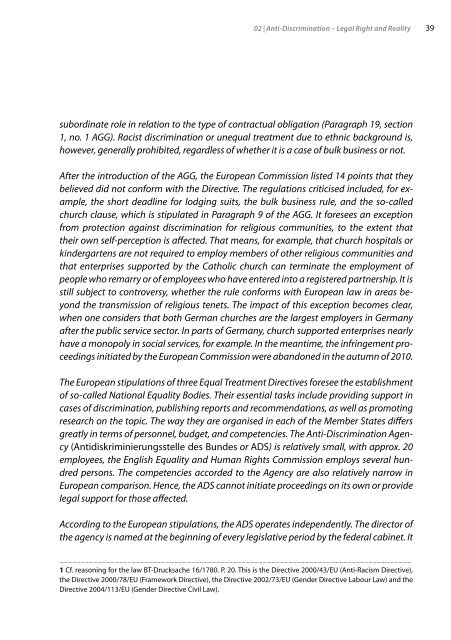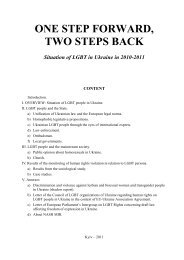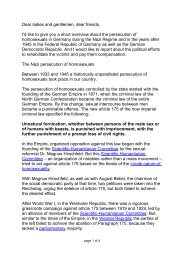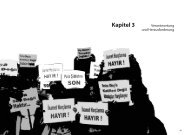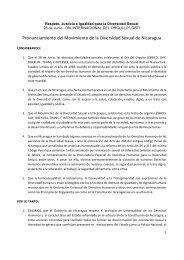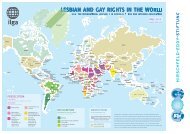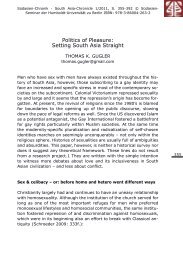Vom Verbot zur Gleichberechtigung - Hirschfeld-Eddy-Stiftung
Vom Verbot zur Gleichberechtigung - Hirschfeld-Eddy-Stiftung
Vom Verbot zur Gleichberechtigung - Hirschfeld-Eddy-Stiftung
Erfolgreiche ePaper selbst erstellen
Machen Sie aus Ihren PDF Publikationen ein blätterbares Flipbook mit unserer einzigartigen Google optimierten e-Paper Software.
02 | Anti-Discrimination – Legal Right and Reality 39<br />
subordinate role in relation to the type of contractual obligation (Paragraph 19, section<br />
1, no. 1 AGG). Racist discrimination or unequal treatment due to ethnic background is,<br />
however, generally prohibited, regardless of whether it is a case of bulk business or not.<br />
After the introduction of the AGG, the European Commission listed 14 points that they<br />
believed did not conform with the Directive. The regulations criticised included, for example,<br />
the short deadline for lodging suits, the bulk business rule, and the so-called<br />
church clause, which is stipulated in Paragraph 9 of the AGG. It foresees an exception<br />
from protection against discrimination for religious communities, to the extent that<br />
their own self-perception is affected. That means, for example, that church hospitals or<br />
kindergartens are not required to employ members of other religious communities and<br />
that enterprises supported by the Catholic church can terminate the employment of<br />
people who remarry or of employees who have entered into a registered partnership. It is<br />
still subject to controversy, whether the rule conforms with European law in areas beyond<br />
the transmission of religious tenets. The impact of this exception becomes clear,<br />
when one considers that both German churches are the largest employers in Germany<br />
after the public service sector. In parts of Germany, church supported enterprises nearly<br />
have a monopoly in social services, for example. In the meantime, the infringement proceedings<br />
initiated by the European Commission were abandoned in the autumn of 2010.<br />
The European stipulations of three Equal Treatment Directives foresee the establishment<br />
of so-called National Equality Bodies. Their essential tasks include providing support in<br />
cases of discrimination, publishing reports and recommendations, as well as promoting<br />
research on the topic. The way they are organised in each of the Member States differs<br />
greatly in terms of personnel, budget, and competencies. The Anti-Discrimination Agency<br />
(Antidiskriminierungsstelle des Bundes or ADS) is relatively small, with approx. 20<br />
employees, the English Equality and Human Rights Commission employs several hundred<br />
persons. The competencies accorded to the Agency are also relatively narrow in<br />
European comparison. Hence, the ADS cannot initiate proceedings on its own or provide<br />
legal support for those affected.<br />
According to the European stipulations, the ADS operates independently. The director of<br />
the agency is named at the beginning of every legislative period by the federal cabinet. It<br />
.............................................................................................................................................................................................................................................................................<br />
1 Cf. reasoning for the law BT-Drucksache 16/1780. P. 20. This is the Directive 2000/43/EU (Anti-Racism Directive),<br />
the Directive 2000/78/EU (Framework Directive), the Directive 2002/73/EU (Gender Directive Labour Law) and the<br />
Directive 2004/113/EU (Gender Directive Civil Law).


